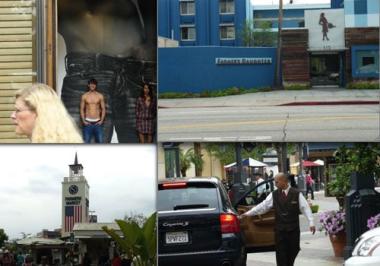The famous and near-famous are different from you and me. Take their farmers' markets, for example. In the Hollywood section of Los Angeles, just next to CBS studios, a former dairy farm became a farmers' market 75 years ago whe an oil magnate saw potential at 3rd Street and Fairfax. Believing that Angelenos needed a place to meet in the sprawling city, he leased the land to developers. Wooden stalls were erected and people flocked to the place to sell fish, meat, veggies and fruit.
Several years ago, developers stepped in to add a little Hollywood to the old farmers' market. The "Grove" has an Abercrombie and Fitch, dancing fountains and curbside valet service. The farmers' market is now a food court, and only a handful of vendors remain. Although there are live models at Abercrombie, there is not a live farmer to be found in the food court or at the Farmer's Daughter Hotel across the street.
In a nearby neighborhood known as Larchmont, TV stars mingle with Hasidic families in a community where the farmers' market is the real deal, California style. That means everything from olive oil to avocados to tomatoes year round. It was an impressive showing since the state of California is one of the world's largest exporters of fruit and vegetables. The ATM and live mariachi band were a nice touch. What don't they have in California?
At a nearby eating establishment called Milk, I asked for a glass of raw milk. The answer was no, though they had some Lakers cupcakes with orange and blue frosting. It was a trick question because raw milk is not sold in many stores. Even in Massachusetts it requires a bit of a drive, but it is worth it. Raw milk has an unbelievably rich taste and unique health benefits and can be addictive if you're under 18 months.
Raw milk is not pasteurized or homogenized. In Massachusetts it can't be purchased in stores, but can be bought at farms. Strict health regulations require periodic inspections of the facilities. People who grew up on raw milk say it kept them healthy as kids. Adults drinking it now do so for the flavor, nutrients and natural antibodies.
The key to healthy raw milk is a clean environment. Last month, Nestle's cookie dough was recalled for E. coli bacteria contamination. Who knew mass-produced cookie dough could be hazardous to health? Small farm owners, that's who. Because they serve a small market, they're naturally accountable for what they sell.
A local farmer in Greenfield recently set up a raw milk CSA (community-supported agriculture farm). Membership is required so owner Kyle Bostrom can keep track of his clientele. "It's important to me to know where it is going and to see how people are doing," says Bostrom. Bostrom Farm is a 24-acre parcel on Colrain Road where he is raising 15 cows and several pigs.
Bostrom sells his meat at the Greenfield Farmer's Market, to Hope and Olive Restaurant, to a commercial account and to individuals. The inventory consists of beef T-bones, ribs, steak, ground beef, stew beef, beef jerky, pork chops, hot dogs, bacon, ham, hamsteak, shoulder, smoked hocks, sausage for grilling (both sweet and hot), and bacon. The bacon is very popular.
"I wish I had longer hogs," says Bostrom. The pigs live in an open pen and eat hay and straw with some grain. "Grazing animals are curious," Bostrom adds, "and people in the neighborhood wouldn't like it if they got out." The cows, however, eat only the grass, healthier than grain with growth hormones.
Bostrom grew up on what he calls a "starvation farm" where the family raised what they ate. After moving to the Valley from Vermont, he purchased the farm in Colrain. "My big dream is to have a store," he says, adding that a cream line dairy would be nice also. Currently he runs the farm, sells the meat and raw milk, and works a full-time job.
If he can pull off volume sales of raw milk, Bostrom's dream might come true. According to a report released last February by the Massachusetts Raw Milk Network, a division of the Northeast Organic Farming Association (NOFA), the relatively arcane practice of feeding cows grass, milking them and selling the milk right there on the farm is growing in popularity and is a good example of sustainable farming. Entitled "Local, Fresh and Raw: Unpasteurized Milk in Massachusetts," the report shows that Massachusetts had 25 active raw milk dairies that sold more than 80,000 gallons of milk to consumers in 2008.
It is not easy for the farmers. Inspection regulations require time and effort, but prices, which range from $3 to $9 for a gallon, with an average of $6, are stable. That is not the case for traditional dairy farmers who sell milk for processing. Those prices are set by the federal government and it is putting some of those farmers out of business. They are making a profit of $1 per gallon on average and feed costs are skyrocketing.
If you have the chance to see the film Food, Inc. (in theatres now), you will appreciate how lucky we are to have responsibly raised livestock in the Valley. The health hazards associated with factory farming and the treatment of animals add up to a hairraising account of how food gets to the store.
In Massachusetts, raw milk is now considered a viable part of the agricultural economy. The following farms in the Valley are among those that have been approved by the Department of Agricultural Resources to sell raw milk: Sidehill Farm, Ashfield, Farm Stead at Mine Brook in Charlemont, and Hager Brothers in Colrain.
Visit ValleyLocavore.com for more information on the farms and the entire NOFA report about raw milk.



